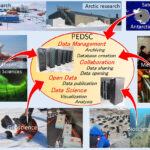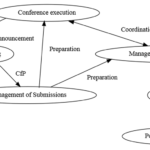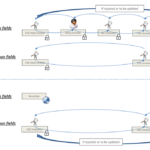

Sea levels rising twice as fast as thought in New Zealand
Explosive new data shows the sea level is rising twice as fast as previously thought in some parts of Aotearoa, massively reducing the number of times authorities has to respond. The major new projections show infrastructure and homes in Auckland and Wellington – as well as many other places – risk inundation decades earlier than expected.
Risk Data Hub, a renewed space to support EU countries with disaster prevention and preparedness
More than 2400 disastrous events related to natural hazards have struck Europe in the last 30 years. The Risk Data Hub (RDH) hosts resources to help authorities manage risks and justify financial support requests to cope with these major events. The ultimate goal of this comprehensive hub is to offer data to help improve risk assessments in the stages before, during and after a disaster hits Europe.
Addressing food security and climate change through regenerative agriculture
One of the significant challenges that Bangladesh faces is ensuring food security for a growing population. The most viable and holistic solution to this problem is regenerative agriculture. Regenerative agriculture is a farming system that attempts to conserve soil and contribute to multiple provisioning, regulating and supporting services of the ecosystem and aims to enhance the environmental, social and economic sustainability of food production.
After the relentless rain, South Africa sounds the alarm on the climate crisis
Survivors of South Africa’s devastating floods have described “sheet upon sheet of relentless rain” that washed away entire houses, bridges and roads, killing about 450 people and making thousands homeless. The storm, which delivered close to an entire year’s usual rainfall in 48 hours, took meteorologists by surprise and has been blamed by experts on climate change. The new disaster comes after three tropical cyclones and two tropical storms hit southeast Africa in just six weeks in the first months of this year.
Risk insurance builds climate and disaster resilience in Central America and the Caribbean
Drought-monitoring technology that is currently being embedded in water and agricultural ministries in Jordan, Lebanon, and Morocco will now be implemented in Tunisia. The satellite-based enhanced composite drought index (eCDI) supports effective drought management by enabling authorities to identify, early on, the presence and evolution of drought.
Empowering people to adapt on the frontlines of climate change
A new platform will unite climate models, impact predictions, random control trial evaluations, and humanitarian services to bring cutting-edge tools to Bangladeshi communities.

Technical Guidance on Comprehensive Risk Assessment and Planning in the Context of Climate Change
The Technical Guidance on Comprehensive Risk Assessment and Planning in the Context of Climate Change provides orientation on how risks in the context of climate change can be comprehensively and systemically addressed through risk assessment. Decision-making, planning, and integrating disaster risk reduction (DRR) and climate change adaptation (CCA) perspectives and approaches while simultaneously linking to other goals and targets (e.g. the Sustainable Development Goals (SDGs)) are also discussed.
Global Risk Assessment Report 2022 (GAR2022)
GAR2022 explores how, around the world, structures are evolving to better address systemic risk. The report shows how governance systems can evolve to reflect the interconnected value of people, the planet and prosperity.
Financing for Sustainable Development Report 2022
The study of flood risk perception factors can be considered by using different paradigms. In an attempt to understand risk perception, two basic paradigms can be distinguished: rationalist and constructivist. This review paper aims to assess the importance of the rationalist and constructivist approaches in research on flood risk perception and flood risk management more broadly.
The United Nations World Water Development Report 2022: groundwater: making the invisible visible
This brief explores key improvements in data delivered by SHEAR projects. The SHEAR programme (Science for Humanitarian Emergencies and Resilience) carried out innovative research, in some of the most hazard-prone parts of the world, to better understand and forecast disasters, and minimize the risk they pose to vulnerable communities.
Compound risk analysis of natural hazards and infectious disease outbreaks
This study explores the potential impacts of compounding risk between natural hazards and infectious disease outbreaks such as the recent COVID-19 pandemic in the Central Asia Regional Economic Cooperation (CAREC) region. Compound risk occurs when two or more shock events overlap, inducing additional pressure on social and physical vulnerabilities. As part of the study, scenarios of a natural hazard occurring during an outbreak are created for each CAREC country.

The Third Multi-Hazard Early Warning Conference – 23-24 May
As we approach the mid-point of the Sendai Framework for Disaster Risk Reduction, MHEWC-III provides a unique opportunity to review key accomplishments, and share skills, experience, and expertise within an active network of early warning practitioners.
Seventh Session of the Global Platform for Disaster Risk Reduction (GP2022)- 23 to 28 May
The Global Platform for Disaster Risk Reduction is the main global forum to assess and discuss progress on the implementation of the Sendai Framework for Disaster Risk Reduction. The seventh session of the Global Platform (GP2022) will be organized by the UN Office for Disaster Risk Reduction (UNDRR) from 23 to 28 May 2022, in Bali, Indonesia, hosted by the Government of Indonesia. The event will be co-chaired by the Government of Indonesia and UNDRR.
Geo Virtual Symposium – Global action for local impact – 2-5th May
With the theme ‘Global Action for Local Impact’, the GEO Virtual Symposium 2022 will explore how the portfolio of GEO products and services can provide insights and evidence for policy development and decision making, which is expected to lead to local impact over time. The symposium will foster dialogue among local stakeholders, GEO Work Programme (GWP) activities and other partners to discuss transversal environmental and societal issues, and identify potential integrative EO-based solutions in selected regions.
Call for paper Special Issue “Post-disaster Recovery and Climate Change Adaptation – an Asia-Pacific Perspective”
This Special Issue aims to present a platform for the exchange of the latest research and practices in post-disaster recovery and climate change adaptation in the Asia-Pacific region. Themes of particular interest include reasons for current inadequacies and context-specific challenges contributing to failed recovery and adaptation in the region, lessons learnt from past disaster experiences, innovative post-disaster reconstruction and recovery practices, and sustainable and practical solutions for adapting to climate change that is applicable to the Asia-Pacific region. We are seeking articles duly addressing environmental, cultural, economic and social aspects of post-disaster recovery and climate change adaptation within the scope of Sustainability.
Floods and other secondary perils: opportunity or threat for the industry?
18 May 2022
The Swiss Re Institute’s annual Natural Catastrophe sigma has become the benchmark in documenting the human and financial impact of disasters. The report compares these losses to prior years and historical averages to put the year in perspective. This hybrid event will look at the main natural catastrophe loss drivers for 2021 and how the year stacks up against others. We’ll take a deeper dive into flood risk and what the insurance industry can do to help build societal resilience in the face of increasing secondary perils.
The World Reconstruction Conference- 23-24 May 2022
The World Reconstruction Conference is a global forum that provides a platform to collect, assess, and share disaster reconstruction and recovery experiences and take forward the policy dialogue for effective international disaster recovery and reconstruction framework.








